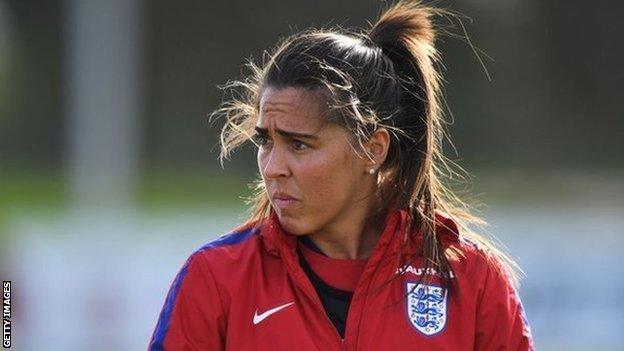Fara Williams: Ex-England international reveals eating disorder culture in women's game
- Published

Fara Williams is England's most capped player with 172 caps
Former England international Fara Williams has revealed she was worried about a culture of eating disorders in women's football during her career.
Williams, 38, England's most capped player, said players were put into a "fat club" and shamed if their body fat percentage was considered too high.
She played for WSL clubs including Everton, Liverpool and Arsenal during a career spanning two decades.
"I always thought there's an issue with women's football," said Williams.
"For me, to label something as 'fat club' as a professional is crazy."
A recent confidential study, external exploring mental health issues among women footballers in the top two tiers of the English game reported that 36% of the 115 players who competed displayed symptoms of an eating disorder.
Williams said: "It was something that I was concerned about as a player and having been an experienced player in the international set-up. I was there for 20-odd years.
"It was very uncomfortable for me at times because I like food, I like to eat, but you felt as though you couldn't eat certain foods because you were being watched."
Speaking at the launch of the BBC's Women's Euro 2022 coverage, Williams continued: "We're not educated about the foods we're supposed to have.
"We talk about 'it's great now wearing your own fitted kit', but you've got to look a certain way to fit into that kit.
"So when you had bigger, baggier kits you could hide a lot underneath it. Now when they're fitted, you see a lot.
"For me I worry, when you see a lot of these players you can see that they're struggling with their diet.
"You get a fat test every time you go into training camp and, if you're not under a certain body percentage, you go into 'fat club'," added Williams.
"I was always worried as a player. I was never in 'fat club'. I would never go - I would just not play the game.
"But it was a term openly used at big clubs in the Women's Super League. An openly used term - you go into 'fat club'."
Matt Lawson is a coach and dietitian who has worked closely with the Professional Footballers' Association (PFA), external to help players learn how to meet their nutritional needs.
"Those involved in football have definitely seen a rise in football-related eating disorders over the last 20 years," Lawson told the organisation in Eating Disorder Awareness Week in March.
"There's a misconception that disordered eating is exclusively a female issue, but the reality is there are just as many men struggling with eating disorders, particularly in male sports."

Is food as addictive as drugs? Explore the latest evidence underpinning the scientific basis for overeating
From Hollywood to rural England: Joe Wicks and Russell Brand discuss fatherhood and going grey
